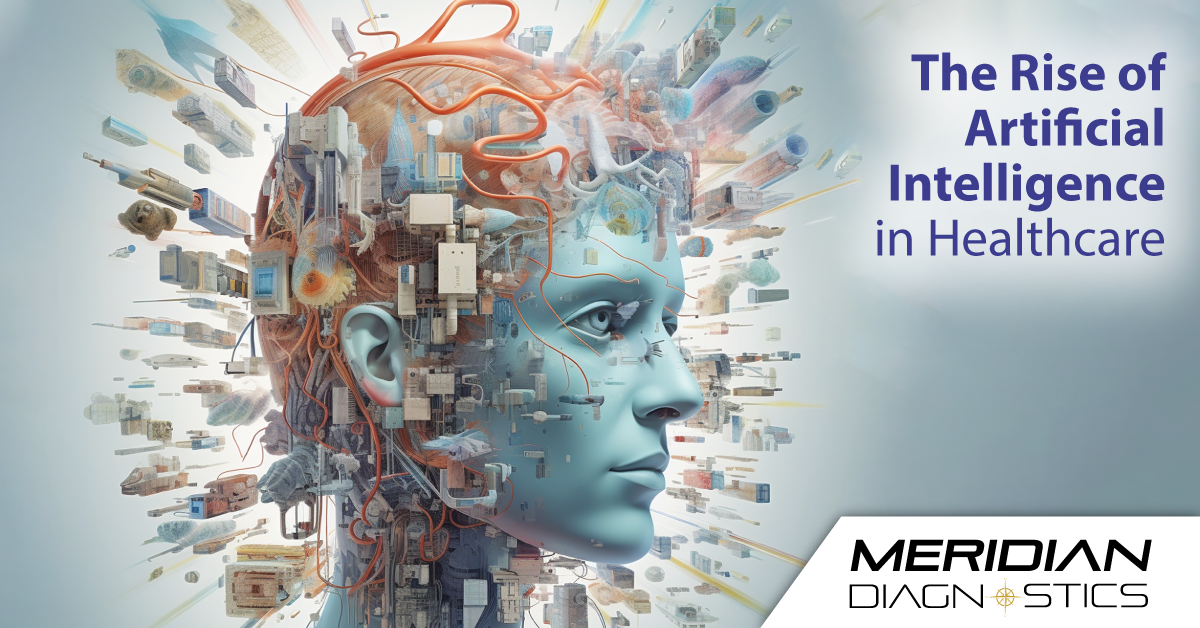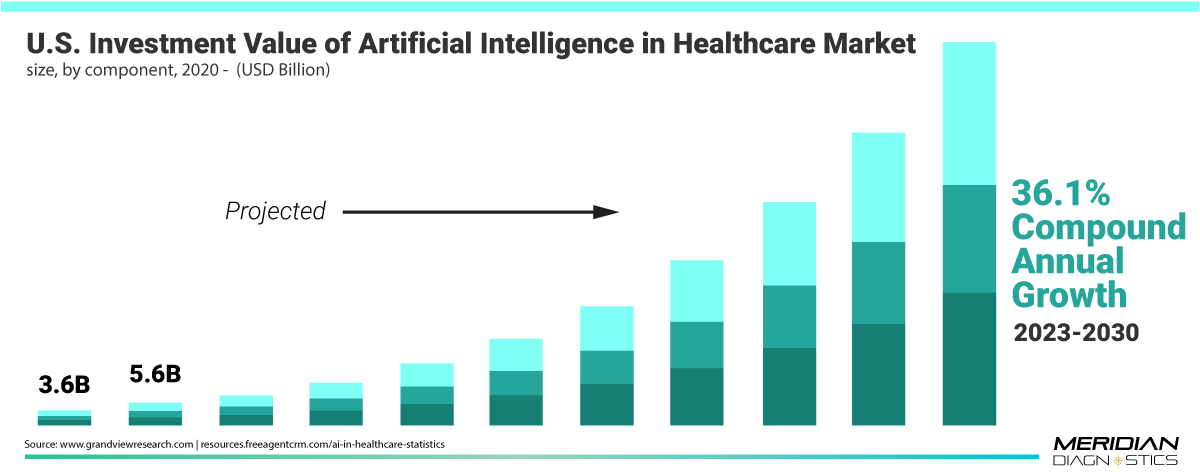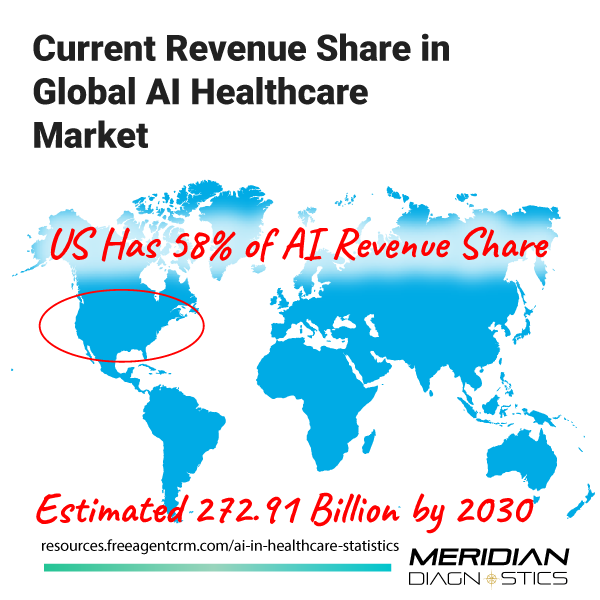
In the ever-evolving landscape of healthcare, advancements in technology continue to shape the way we approach patient care. One such technological breakthrough that has gained significant attention is artificial intelligence (AI). With its potential to revolutionize healthcare practices, AI is poised to transform the way we diagnose, treat, and prevent diseases. In this article, we will explore the rise of artificial intelligence in healthcare and its profound impact on the medical industry.
What is Artificial Intelligence in Healthcare?
Artificial intelligence, in the context of healthcare, refers to the use of computer algorithms and machine learning techniques to analyze vast amounts of medical data and provide valuable insights for decision-making. AI models can process data much faster than humans, enabling the identification of patterns, trends, and correlations that may go unnoticed otherwise.
What is 'AI'
Artificial intelligence (AI) is a term widely used to describe the application of algorithms and machine learning in the healthcare space. It encompasses various technologies that enable computers and systems to mimic human intelligence and perform tasks traditionally requiring human cognition. In healthcare, AI encompasses a range of applications, including data analysis, pattern recognition, predictive modeling, and decision support systems. AI algorithms can analyze vast amounts of medical data, such as patient records, images, and genetic information, to extract valuable insights and assist healthcare professionals in diagnosis, treatment planning, and disease management.

The Role of AI in Diagnostics and Treatment
Artificial intelligence (AI) is making significant strides in revolutionizing diagnostics and treatment in healthcare. By harnessing the power of advanced algorithms and machine learning techniques, AI has the potential to enhance the accuracy, speed, and personalized nature of medical decision-making. Let's delve deeper into how AI is transforming the landscape of diagnostics and treatment in healthcare.
Enhanced Diagnostics
One of the key areas where AI is making a remarkable impact is in diagnostics. AI models have demonstrated exceptional capabilities in analyzing complex medical data, including imaging scans, pathology slides, and genetic information. For example, AI algorithms have been developed to analyze radiology images, such as X-rays, CT scans, and MRIs, to aid in the detection of abnormalities and assist radiologists in making accurate diagnoses. These algorithms can quickly process vast amounts of image data, flagging potential areas of concern for further evaluation.
In addition to radiology, AI has shown promise in various other diagnostic domains. For instance, AI-powered algorithms can analyze electrocardiograms (ECGs) to detect patterns indicative of cardiovascular diseases, providing valuable insights for early intervention. AI models have also been employed in the interpretation of pathology slides, helping pathologists identify and classify different types of cancer cells more accurately.
Predictive Analytics
Another significant application of AI in healthcare is predictive analytics. AI models can analyze large datasets comprising patient demographics, medical history, genetic information, and treatment outcomes to predict disease progression, treatment responses, and potential complications. This predictive capability can aid clinicians in making informed decisions regarding treatment plans and interventions.
For example, AI algorithms have been used to predict the likelihood of sepsis, a life-threatening condition, in hospitalized patients. By analyzing real-time patient data, including vital signs, laboratory results, and clinical notes, AI models can identify early warning signs of sepsis and alert healthcare providers for timely intervention.
Clinical Decision Support Systems
AI-powered clinical decision support systems (CDSS) are designed to assist healthcare professionals in making evidence-based decisions at the point of care. These systems integrate patient-specific data with up-to-date medical knowledge and guidelines to provide clinicians with diagnostic suggestions, treatment recommendations, and alerts for potential medication interactions or adverse reactions.
CDSS powered by AI can enhance diagnostic accuracy by providing clinicians with a comprehensive overview of relevant patient information, highlighting potential differential diagnoses, and suggesting appropriate diagnostic tests. Moreover, AI algorithms can analyze vast medical literature, clinical guidelines, and research studies to keep healthcare professionals informed about the latest advancements and treatment options.
AI and Elderly Care
With the growth of the geriatric population, the incidence of age-related diseases is expected to rise worldwide. To address this challenge and efficiently manage the increasing burden on healthcare systems, governments and medical professionals are turning to AI as a solution. AI-based tools offer real-time data collection and monitoring for emergency care, as well as provide preventive healthcare recommendations. Moreover, AI can facilitate the implementation of in-home health monitoring, personalized health management, and the use of treatment and physical assistive devices. This technology has a significant role to play in supporting the physical, emotional, social, and mental health of the elderly population.
Current and Potential Uses of AI in the Lab
 Laboratory medicine plays a crucial role in healthcare, providing valuable insights through diagnostic tests. AI has started making its way into the laboratory setting, particularly in molecular pathology and digital pathology. These advancements have the potential to improve laboratory utilization, automate processes, enhance precision test interpretation, and optimize laboratory information systems.
Laboratory medicine plays a crucial role in healthcare, providing valuable insights through diagnostic tests. AI has started making its way into the laboratory setting, particularly in molecular pathology and digital pathology. These advancements have the potential to improve laboratory utilization, automate processes, enhance precision test interpretation, and optimize laboratory information systems.
"Although artificial intelligence has been present in the clinical laboratory setting for some time now, already being used in many chemistry analyzers used for routine testing, this new age of AI paired with robotics is leading the way of innovation for laboratories of all sizes by providing labs a pathway for increased productivity and throughput while avoiding employee burnout" says Rhyan Walcott CEO of Meridian.
Walcott also says "our industry is starting to see trend where some larger diagnostic labs combine artificial intelligence with robots that perform routine pre-analytical to post analytical laboratory tasks. Many of these tasks include sorting specimens, extractions, plating, creating solutions, inventory control, and even storage which were traditional performed by lab technicians and scientists." AI can leverage large volumes of medical data to generate personalized interpretations of test results, shifting from defining normal values in general to defining them for specific individuals. Chemistry and immunology laboratories, with their large and structured datasets, are particularly well-suited to benefit from machine learning techniques.
Molecular Pathology and Digital Pathology
AI techniques have found applications in molecular pathology, particularly in the classification of central nervous system tumors using DNA methylation profiling. By analyzing DNA methylation patterns, AI models can accurately classify tumors, providing valuable insights for diagnosis and treatment planning. Digital pathology, which involves the analysis of digitized histopathology slides, also benefits from AI algorithms. Image analysis tools powered by AI can automate the interpretation of slides, assisting pathologists in identifying and quantifying various cellular features, ultimately improving accuracy and efficiency.
Predicting Laboratory Test Values and Optimizing Utilization
AI has shown promise in predicting laboratory test values based on patient data, aiding in early detection and diagnosis. For instance, a neural network model was used to predict iron-deficiency anemia and serum iron levels using features extracted from routine complete blood count results. Such predictions can guide healthcare professionals in timely interventions and tailored treatment plans.
Additionally, AI can optimize laboratory utilization by analyzing test ordering patterns and suggesting appropriate tests based on patient characteristics. Machine learning models have been developed to recommend laboratory tests, reducing unnecessary testing and improving resource allocation. These AI-based approaches hold great potential for streamlining laboratory workflows and improving efficiency.
Advantages and Challenges of AI in Healthcare
The advantages of AI in healthcare are manifold. AI technology enables rapid analysis of data, leading to improved diagnosis and treatment decisions. It can automate administrative tasks, freeing up valuable time for healthcare professionals to focus on patient care. Moreover, AI allows for health monitoring through wearable devices and facilitates digital consultations, providing essential data for both patients and healthcare providers.
However, several challenges need to be addressed for the routine implementation of AI in healthcare. These include the collection of high-quality and diverse datasets, managing costs associated with computational infrastructure and personnel, and establishing guidelines for the clinical validation of AI algorithms. Additionally, the unfamiliarity with AI technology and the need for proper training and integration into existing workflows pose hurdles that must be overcome.
The rise of artificial intelligence in healthcare presents a paradigm shift in the way we approach patient care. AI has the potential to improve diagnostics, personalize treatments, and optimize healthcare delivery. While challenges still exist, the integration of AI in the medical industry holds great opportunities for the future of the clinical laboratory space and the entire healthcare industry.